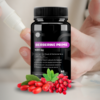Berberine and PCOS: A Natural Approach to Managing Symptoms
Polycystic Ovary Syndrome (PCOS) is a common hormonal disorder affecting millions of women worldwide. Characterized by irregular menstrual cycles, excess androgen levels, and polycystic ovaries, PCOS can lead to a range of health issues, including infertility, weight gain, and insulin resistance. Managing PCOS often requires a multifaceted approach, combining lifestyle changes, medication, and supplements. One natural supplement gaining attention for its potential benefits in managing PCOS symptoms is Berberine. This blog will explore how Berberine can help women with PCOS by regulating hormones and improving insulin resistance, offering a natural approach to symptom management.
PCOS is a complex endocrine disorder that affects various aspects of a woman’s health. It is one of the leading causes of infertility and is associated with a higher risk of developing metabolic syndrome, type 2 diabetes, and cardiovascular diseases. The primary features of PCOS include:
- Irregular Menstrual Cycles: Women with PCOS often experience infrequent or prolonged menstrual periods, making it challenging to predict ovulation and increasing the risk of infertility.
- Hyperandrogenism: Elevated levels of androgens (male hormones) can lead to physical symptoms such as excess facial and body hair, acne, and scalp hair thinning.
- Polycystic Ovaries: Ovaries may develop numerous small follicles and fail to regularly release eggs, further complicating fertility issues.
- Insulin Resistance: Many women with PCOS have insulin resistance, where the body’s cells do not respond effectively to insulin, leading to elevated blood sugar levels and an increased risk of type 2 diabetes.
The Role of Insulin Resistance in PCOS
Insulin resistance plays a critical role in the development and progression of PCOS. When the body’s cells become resistant to insulin, the pancreas compensates by producing more insulin, leading to hyperinsulinemia (excess insulin in the blood). High insulin levels can trigger the ovaries to produce more androgens, exacerbating symptoms like irregular periods, acne, and hirsutism. Therefore, improving insulin sensitivity is a key strategy in managing PCOS symptoms and reducing the risk of long-term complications.
Berberine: A Natural Solution for PCOS
Berberine is a natural alkaloid found in various plants, such as Berberis, Goldenseal, and Oregon grape. It has been used for centuries in traditional medicine to treat various ailments, but recent research has highlighted its potential benefits in managing metabolic and hormonal disorders, including PCOS.
Berberine and PCOS Management
- Improving Insulin Sensitivity: One of the most significant benefits of Berberine for women with PCOS is its ability to improve insulin sensitivity. Berberine activates AMPK (Adenosine Monophosphate-Activated Protein Kinase), an enzyme that plays a crucial role in regulating glucose uptake and lipid metabolism. By activating AMPK, Berberine enhances insulin sensitivity, reduces blood sugar levels, and lowers insulin levels in the blood. This improvement in insulin sensitivity can help regulate menstrual cycles and reduce androgen levels, alleviating many PCOS symptoms.
- Regulating Hormonal Imbalance: Berberine’s impact on insulin levels indirectly helps regulate hormonal imbalances in women with PCOS. By lowering insulin levels, Berberine can reduce the excessive production of androgens by the ovaries, leading to a decrease in symptoms such as acne, hirsutism, and irregular periods. Furthermore, Berberine has been shown to lower testosterone levels, further helping to balance hormones in women with PCOS.
- Supporting Weight Management: Many women with PCOS struggle with weight gain and difficulty losing weight due to insulin resistance and hormonal imbalances. Berberine’s ability to improve insulin sensitivity and activate AMPK can support weight loss by enhancing fat metabolism and reducing fat storage. Weight management is a crucial aspect of managing PCOS, as even a modest reduction in body weight can significantly improve symptoms and reduce the risk of complications.
- Improving Ovulation and Fertility: One of the primary concerns for women with PCOS is infertility due to irregular ovulation. Berberine has been found to improve ovulation rates in women with PCOS, making it a potential natural alternative to traditional fertility treatments like Clomiphene. By regulating insulin levels and improving hormonal balance, Berberine can help restore regular ovulation, increasing the chances of conception for women with PCOS.
- Reducing Inflammation: Chronic low-grade inflammation is common in women with PCOS and can contribute to insulin resistance and other metabolic complications. Berberine has potent anti-inflammatory properties that can help reduce inflammation markers in the body, further supporting metabolic health and reducing the risk of long-term complications associated with PCOS.
Berberine vs. Metformin: A Natural Alternative
Metformin is a commonly prescribed medication for managing insulin resistance in women with PCOS. However, Berberine has been shown to have comparable effects on improving insulin sensitivity and reducing blood sugar levels, making it a viable natural alternative for those who prefer herbal supplements over pharmaceuticals.
Several studies have compared Berberine to Metformin in women with PCOS, with promising results. For example, a study published in the journal *Human Reproduction* found that Berberine was as effective as Metformin in improving insulin sensitivity and regulating menstrual cycles in women with PCOS. Additionally, Berberine was associated with fewer gastrointestinal side effects, making it a more tolerable option for many women.
How to Take Berberine for PCOS
Berberine is typically taken in supplement form, with recommended doses ranging from 500 mg to 1500 mg per day, divided into two or three doses. It is important to start with a lower dose and gradually increase it to reduce the risk of gastrointestinal side effects, such as diarrhea or stomach cramps.
For women with PCOS, Berberine can be taken alongside lifestyle changes, such as a balanced diet, regular exercise, and stress management, to maximize its benefits. As with any supplement, it is essential to consult with a healthcare provider before starting Berberine, especially if you are already taking medication for PCOS or other health conditions.
Berberine offers a promising natural approach to managing the symptoms of PCOS, particularly by improving insulin sensitivity and regulating hormonal imbalances. Its ability to activate AMPK, support weight management, and improve ovulation rates makes it a valuable tool for women seeking alternative treatments for PCOS. While Berberine can be a powerful ally in managing PCOS, it is essential to approach it as part of a comprehensive treatment plan that includes lifestyle changes and professional medical advice.
By understanding how Berberine works and incorporating it into a holistic approach to managing PCOS, women can take control of their symptoms and improve their overall health and well-being.
To ensure you’re getting the highest quality supplements like Berberine Prime, Alpha Max, and many more, visit humangrowthhormones.com. Our website offers a carefully curated selection of products designed to support your health and fitness goals. Don’t settle for less—trust the best for your body.









Add comment